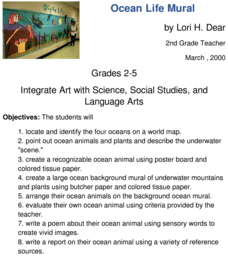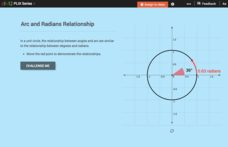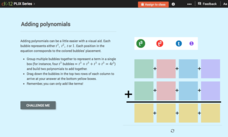Curated OER
Now That's a Problem!
Help learners improve multiplication skills by skip counting and creating their own multiplication word problems. They will begin by practicing skip counting and then illustrate word problems using a software program. Pixie is a software...
Curated OER
A Photosynthesis Timeline
Science learners discover that scientific advancements come in increments. Beginning as an idea, changes and developments are influenced by available resources and current societal values. As an example, pupils examine the conclusions...
Curated OER
Ocean Life Mural
How many oceans can you name? First, have learners try to name as many oceans as they can, and then have them locate and identify the oceans on a world map. They create a recognizable ocean animal using poster board and tissue paper....
Curated OER
All Americana
Fifth graders research American landmarks and symbols. In this United States history lesson, 5th graders create a KWL chart about the symbols of America and take notes during a PowerPoint presentation. Students complete the rest of the...
Curated OER
Mythological Word Origins
Review myths and the characters therein, connecting them to vocabulary words in the English language today. Begin by searching online for myths and character names. With at least ten names that are familiar English words, students use...
Curated OER
Simple Machines
Have your class conduct research to learn all they can about simple machines. They use the web, take notes from a video, write a script, then make a film describing various simple machines found in real life. These videos are then...
Curated OER
Peer Review Form for Scientific Writing
A peer review form just for science? Specifically tailored for science writing, this resource asks editors to give detailed responses to questions about the relevance of the study, the clarity of the hypotheses, the methods, materials,...
Curated OER
Armadillo: Reporting on War
Point of view is everything, especially when reporting about the war in Afghanistan. Class members compare and contrast the same event from the war in Afghanistan as reported by five different sources. Learners are also asked to rank the...
Curated OER
Structure of Natural Narratives
Class pairs select a prompt from a provided list and tell (and record) their story to their partner. They then examine linguist William Labov's model for natural narratives, and apply his model to their tale. Next, class members watch...
Pulitzer Center
China's Rising Labor Movement
Young historians will explore the complex causes and effects of industrialization in China by perusing the numerous articles included in this webpage. Throughout the resource, there are many writing and discussion prompts to help direct...
Hawaiʻi State Department of Education
Dance Critic
What do writing and dance have in common? They both have a six-trait rubric for assessment. Just like a good story, a good dance must have a hook, beginning, middle, end, logical sequence, and a climax. Learners use a...
Hawaiʻi State Department of Education
Mask Symmetry
When you engage learners in creating symmetrical objects you are also building their vocabulary and math sense. Kids discuss key words such as, asymmetrical, symmetrical, balance, tint, and shade. They use these elements of design to...
CK-12 Foundation
Multiplying Matrices by a Scalar: Making Matrix Patterns
Scalar multiplication equations can be a drag. Scholars determine missing matrices to make correct scalar matrix multiplication equations. They place the correct matrix into the equations within the interactive resource and analyze the...
CK-12 Foundation
Rectangular to Polar Form for Equations: Polar Coordinates
Plot points around a wheel. Pupils use an interactive tool to plot a point using polar coordinates with the aid of a wheel. Scholars use the interactive to answer five questions to finish the lesson. The resource provides background...
CK-12 Foundation
Angles of Elevation and Depression: Fly-By Calibration
Determine the distance between two trees from afar. Pupils use an interactive resource to create two right triangles using trees and a plane. They determine the horizontal legs of each triangle to find the distance between the two trees.
CK-12 Foundation
Reference Angles and Angles in the Unit Circle: Exploring Reference Angles
A steal of a deal — get four angles for the value of one. An interactive resource allows individuals to visualize all four angles that have the same reference angle. Pupils answer questions by using the interactive to create the...
CK-12 Foundation
Conversion between Degrees and Radians: Arc and Radians Relationship
How are arc lengths and radians related? An interactive resource demonstrates the relationship as pupils create arc lengths in a unit circle and compare them to the angle measurements. Questions ask individuals to build upon this...
CK-12 Foundation
Law of Cosines: Baseball Diamond
Catch a great resource! Individuals use an interactive that allows them to move players on a baseball field. They calculate distances between players using the Law of Cosines.
CK-12 Foundation
Addition and Subtraction of Polynomials: Adding Polynomials
Stack the like terms to add vertically. The resource contains a visual aid to help with the addition of polynomials using the vertical method. Pupils use the aid to calculate the sum of two polynomials.
CK-12 Foundation
Geometric Probability: Dartboard
Get your class on target with probability using an exciting resource. The interactive presents three square dartboards with different target areas, which are combinations of square units. Pupils determine the probabilities of randomly...
CK-12 Foundation
Sums and Differences of Independent Random Variables: Traveling Seasickness
Use a Punnett square to calculate probabilities. The resource presents a situation in which two patients are randomly selected from a group of patients with a particular illness. Pupils use the interactive to determine the likelihood...
CK-12 Foundation
Expected Value: Playing Darts
The expected payoff is right on target. An interactive resource provides a dart game scenario with amounts of cash prizes and probabilities of winning. Learners calculate the expected value and expected payoff for the game. To...
CK-12 Foundation
Scientific Models: Mathematical, Physical and Conceptual
This is one super model interactive! Middle and high school science scholars examine scientific models through a simple resource. Guided, hands-on practice allows them to classify conceptual, mathematical, and physical models. Other...
CK-12 Foundation
Topographic and Geologic Maps: Topographic Maps
Maps are great for helping you get where you're going, but what does that place actually look like? Geology scholars compare and contrast the features of topographical and geologic maps using an interactive lesson. The resource describes...

























